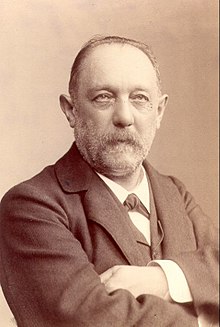Emanuel Mendel
Emanuel Mendel (born October 28, 1839 in Bunzlau, today Bolesławiec in Lower Silesia ; died June 23, 1907 in Pankow near Berlin ) was a German neurologist, psychiatrist and politician.
Life
Mendel studied medicine in Breslau and Berlin and received his doctorate on epilepsy in 1860 . During his studies in 1856 he became a member of the Raczek fraternity . He then worked in the practice of the Pankow doctor Eduard Heymann. He took over the practice in 1864 and set up a clinic for the mentally ill in 1868 at Pankower Breiten Straße 18 / 18a. He then specialized in neurology and psychiatry , interned with Rudolf Virchow and Wilhelm Griesinger and qualified as a professor in 1873. From 1884 he taught psychiatry and neurology as well as forensic psychiatry with an extraordinary professorship at the Friedrich-Wilhelms-Universität Berlin and became director of the mental hospital . In 1885 he gave up the management of his own mental hospital and sold it ten years later to Gustav Scholinus . Sigmund Freud had sat in at Mendel's institute in 1886 and also published in the journal Neurologisches Centralblatt , which Mendel founded in 1882 and published until his death. Subsequently, Mendel's son Kurt took over the editing .
As a member of the Progressive Party, Emanuel Mendel belonged to the Niederbarnim district council . In 1893 he enabled the construction of a waterworks in Pankow by donating a piece of land. On his initiative, a hospital was built on Galenusstrasse in Pankow in 1905/06. In 1911, the municipality of Pankow erected a marble bust of Mendel in the garden of the hospital, which was removed by the National Socialists in 1935 and has disappeared. For two electoral terms, Mendel was also a member of the Reichstag from 1877 to 1881 , where he was involved in health issues. In 1906 he was given the title of " Secret Medical Councilor ".
Mendel was one of the founders of the Central Association of German Citizens of Jewish Faith in 1893 and was a member of the board of the Central Association.
When he died, he left his wife Susanne, their two sons Kurt and Fritz and their daughters Gertrud and Charlotte. He was the only citizen of Pankow to have the honor of being laid out in the great hall of the town hall. He is buried in the urn cemetery on Richtstrasse . His grave is designated as the honor grave of the city of Berlin .
plant
Mendel dealt mainly with the research and therapy of progressive paralysis, mania and epilepsy . Theodor Draw paid tribute to his work, saying that Mendel had only created the psychiatric monograph for Germany. It stood for a synthesis of psychiatry and neurology. In 1893 he introduced an extract of the Australian plant Duboisia myoporoides into Parkinson's therapy. He ran a polyclinic with a laboratory that was attached to the university, but not part of it. After his death in 1907, his student Louis Jacobsohn-Lask took over the management until the institute closed in 1914. His better-known students also include Max Bielschowsky (1869–1940), Edward Flatau (1869–1932) and Lazar Minor (1855–1942).
In the Pankow district, a street that was built during the construction of the waterworks was named after him as early as 1893. In 1938 the street was named Elmstraße, but got its old name back in 1947. A primary school in Pankow is also named after him. In 2003, a memorial plaque was unveiled on the former home of the Mendel family at 44 Breite Strasse.
Publications
- De operationibus ad sanandam epilepsiam adhibitis: Adjectis duabus observationibus . Berlin 1860.
- The progressive paralysis of the mad. Berlin 1880.
- The mania. A monograph. Vienna 1881. Reprint: VDM, Müller, Saarbrücken 2007, ISBN 978-3-8364-1899-7 .
- The hypnotism . Hamburg 1889.
- Hereditary syphilis in its relationship with the development of diseases of the nervous system. Berlin 1896.
- Guide to Psychiatry for Medicine Students. Enke, Stuttgart 1902. Machdruck: VDM, Müller, Saarbrücken 2006, ISBN 978-3-86550-935-2 .
literature
- Emanuel Mendel , in: Ernest Hamburger : Jews in public life in Germany: members of government, officials and parliamentarians in the monarchical era. 1848-1918 . Tübingen: Mohr, 1968, p. 300
- Helge Dvorak: Biographical Lexicon of the German Burschenschaft. Volume I: Politicians. Sub-Volume 4: M-Q. Winter, Heidelberg 2000, ISBN 3-8253-1118-X , pp. 79-80.
- Uta Fleckner: Emanuel Mendel (1839–1907). Life and work of a psychiatrist in Germany at the turn of the century . Dissertation, Free University of Berlin, 1994.
- Paul Näcke : Necrology for Prof. Mendel . In: Archives for criminal anthropology and criminalistics. Volume 28 (1907), p. 379.
- Manfred Stürzbecher: Mendel, Emanuel. In: New German Biography (NDB). Volume 17, Duncker & Humblot, Berlin 1994, ISBN 3-428-00198-2 , p. 39 f. ( Digitized version ).
Web links
- Humboldt University Berlin: Short biography of Emanuel Mendel
- Inauguration of the memorial plaque in Pankow on October 28, 2003 ( Memento of December 13, 2004 in the Internet Archive )
- Commemorative inauguration in Berlin on October 28, 2003
- Prof. Dr. Emanuel Mendel ( Memento of March 3, 2016 in the Internet Archive )
- Postcards from the Pankow mental hospital
- Emanuel Mendel in the database of members of the Reichstag
- Biography of Emanuel Mendel . In: Heinrich Best : database of the members of the Reichstag of the Empire 1867/71 to 1918 (Biorab - Kaiserreich)
Individual evidence
- ↑ http://www.math.rutgers.edu/~zeilberg/family/vorstand.html
- ↑ Th. Draw: In memory of Emanuel Mendel. In: Neurologisches Zentralblatt. Volume 26, 1907, p. 643.
| personal data | |
|---|---|
| SURNAME | Mendel, Emanuel |
| BRIEF DESCRIPTION | German neurologist and psychiatrist as well as politician (DFP), MdR |
| DATE OF BIRTH | October 28, 1839 |
| PLACE OF BIRTH | Bolesławiec, today Bolesławiec , Lower Silesia |
| DATE OF DEATH | June 23, 1907 |
| Place of death | Pankow near Berlin |


